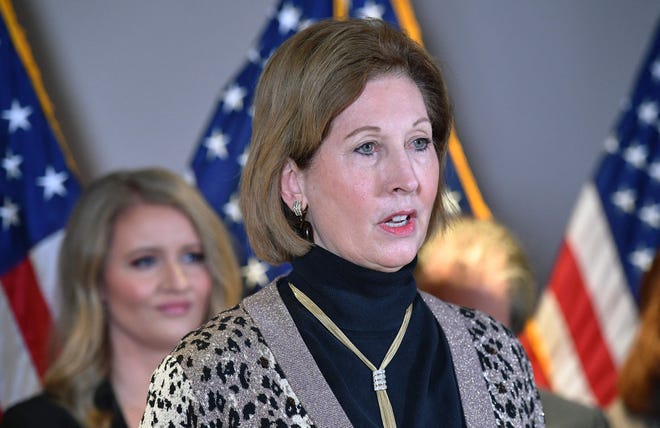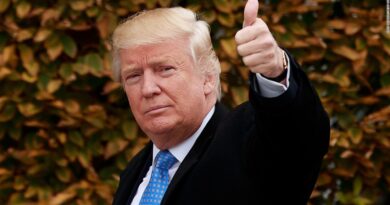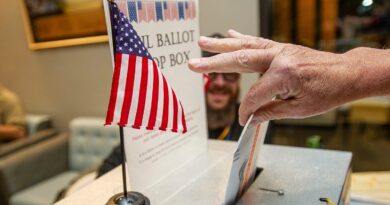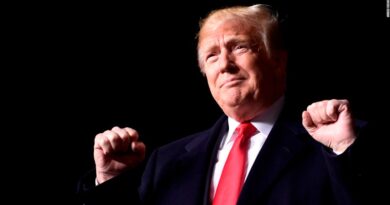QAnon ties, bogus litigation: Book details Trump and the effort to overturn Georgia election
WASHINGTON − In 2020, Georgia was “ground zero for what was arguably the most anti-democratic plot in American history,” according to a new book by two veteran investigative journalists who spent two years examining then-President Donald Trump’s alleged conspiracy to overturn the 2020 election in the Peach State.
The book, “Find Me the Votes: A Hard-Charging Georgia Prosecutor, a Rogue President, and the Plot to Steal an American Election,” by Michael Isikoff and Daniel Klaidman, both formerly of Newsweek and Yahoo News, was released last week amid widespread coverage of its revelations, which shed new light on how the plot allegedly went nationwide, as did Fulton County District Attorney Fani Willis’s investigation into it.
Trump and 14 co-defendants, including his former White House chief of staff Mark Meadows and attorney Rudy Giuliani, have denied wrongdoing. The other four people indicted by a Fulton County jury on Aug. 14, 2023, including former Trump legal advisors Sidney Powell and Jenna Ellis, have pleaded guilty in exchange for their cooperation in the case. No trial date has been set.
Here are the book’s 11 most important exclusive takeaways, based on USA TODAY’s reading of it and an interview with Isikoff and Klaidman. USA TODAY attempted to reach everyone named below, but many were unavailable for comment.
The authors told USA TODAY that so far, no one has contested the specific facts of their findings except a spokesman for Senator Lindsey Graham, R-S.C., who called the book’s references to him “total and complete BS.”
Prep for the polls: See who is running for president and compare where they stand on key issues in our Voter Guide
Asked by USA TODAY if he wanted to comment on the book, Trump’s Georgia defense lawyer Steve Sadow replied in an email, saying, “Nope.”
More:Fani Willis admits to relationship with prosecutor. What does that mean for the Trump case?
‘Hunting licenses,’ QAnon ties and bogus litigation
Powell, an election lawyer who spread baseless claims of voter fraud, didn’t just allegedly plot break-ins at election offices around the country to seize voting machines and software in the hopes of proving that hidden computer algorithms had flipped votes from Trump to Biden. She also allegedly then drew up “hunting licenses,” a code name for preemptive presidential pardons that could be given by then-President Trump to operatives assigned to conduct the break-ins.

Trump’s lies about the 2020 election were influenced to a far greater degree than has been known publicly by the QAnon conspiracy cult, according to Isikoff and Klaidman. They said one leader of Trump’s legal effort in Georgia, high-profile lawyer Lin Wood, was a full-fledged QAnon devotee who championed its claims about a vast conspiracy of high-level government pedophiles trying to sabotage Trump’s presidency. Wood reportedly hosted “stop the steal” strategy meetings at Tomotley Plantation, his South Carolina estate that included Powell, former Trump national security advisor Mike Flynn and, by Zoom, a Qanon leader whose online bulletin board hosted the postings that launched the movement. Trump, in turn, allegedly spurred them on, saying, “Go knock ‘em dead,” in a taped phone call with Wood and Powell that was obtained by the authors, they said. Wood and Powell did not respond to requests for a response sent to their lawyers, and Watkins, who the authors said was based in Japan at the time of the meeting, could not be reached for comment.

Trump lawyers may have known some of their consistently unsuccessful lawsuits alleging voter fraud were meritless, hoping merely to create the appearance of controversy by filing suit. In one Nov. 11, 2020, email to Powell, Wood wrote, “I have so much data for you. But we’re not going to need it. We just have to look like we’re pursuing litigation. Ha!”
Election-stealing ‘Martians,’ a secret tape recording and a ‘stone wall’ of resistance
After fighting and losing an epic legal battle all the way to the U.S. Supreme Court to block his grand jury subpoena, Sen. Lindsey Graham, R-S.C., turned on a dime “and threw Trump under the bus,” the authors write, citing a source familiar with Graham’s testimony before Willis’s secret grand jury in Fulton County. According to their source, Graham testified that if you told Trump, “that Martians came and stole the election, he’d probably believe you.” Graham’s spokesman, Kevin Bishop, told USA TODAY that the authors never spoke to the longtime senator for the book. “What what they are selling is pretty much total and complete BS,” he said. “At the end of the day, this is all just trash for left wing cash.” Bishop did not specifically refute any of the books findings regarding Graham, but said, “As for the comment about Martians, Graham has publicly said that.”

The bombshell tape of Trump telling Georgia Secretary of State Brad Raffensperger, a fellow Republican, to “find” enough votes for him to topple Biden in the state – more than 11,000 – was secretly recorded by a young Raffensperger aide named Jordan Fuchs. The 30-year-old political consultant initially agreed to arrange the phone call at the request of then-White House Chief of Staff Meadows, and then recorded it without telling Meadows or Raffensperger. The damning piece of evidence of Trump’s efforts to pressure state officials led directly to Willis’s decision to launch the investigation that led to Trump’s indictment. It also helped spur federal charges by Justice Department special counsel Jack Smith. Efforts to reach Fuchs were unsuccessful.
More:Will Trump’s trial in Georgia be on TV? Yes, it will. Here’s what that means for America.
Fuchs’ taping of the call was only part of an extraordinary “stone wall” of resistance by Georgia’s top Republican office holders who thwarted Trump’s efforts to subvert the state’s election results. Raffensperger’s refusal to succumb to Trump’s demands has been reported, but the book details vicious – and at times violent sexual – threats against his wife. It says others, including Georgia Attorney General Chris Carr, also held the line. Carr vowed to resign before defending in court the Trump team’s attempts to convene a special session of the Georgia legislature to anoint pro-Trump electors to replace those won by Biden, according to the book. And he refused to go along with a lawsuit filed by Texas Attorney General Ken Paxton and other GOP attorneys general to overturn the election results. Georgia’s Republican governor Brian Kemp backed Carr on that too, saying, “Well then f*** em’,” referring to Trump and his allies.

More:Remember Trump’s call to ‘find’ votes in Georgia? Meet Fani Willis, the DA who could charge him
Venezuelan interference, a body double and a ‘terrible’ indictment proposal
Willis was subjected to a barrage of vicious personal attacks and threats to her life and her family throughout the lengthy investigation, including from a digitally disguised computer voice sent to her personal cell phone mentioning the names and locations of her two daughters. On the night she announced the grand jury indictment of Trump and the 18 others, Willis’s staff grew so alarmed over internet talk of an assassination attempt as she left the building that they sent out a body double, in a bulletproof vest, instead of her.
Powell, never a formal member of Trump’s legal team, had far more communications with the president throughout the post-election period than has been publicly known, and “had no trouble getting the president on the line.” After a former CIA operative brought her a videotape of a one-time security chief to Hugo Chavez suggesting that the late Venezuelan president had once rigged the kind of voting machines used in the U.S. election, Powell called Trump at the White House to say, “Hey, the guys came through, they got the stuff, we need to send it to you,” the authors wrote, citing “a source at Tomotley who monitored the conversation. Trump, in turn, “seemed excited,” the source said, and Powell arranged for a flash drive containing the video to be flown on a chartered jet straight to the White House. The allegations were debunked by Trump’s own campaign team, but he continued to promote them and encourage top Justice Department officials to “seize” voting machines to try to show that Venezuelan socialists had manipulated the election to benefit Biden.
The Trump campaign was more connected to one of the major counts in the Fulton County indictment than previously known – the orchestrated effort to intimidate Ruby Freeman, an African American election worker, into falsely claiming that she stuffed ballots for Biden on election night, the authors wrote. Harrison Floyd, leader of a group called Black Voices for Trump, not only dispatched Kanye West’s publicist to intimidate Freeman at her home and tell her she was in danger but was paid $136,236 in 32 payments by the Trump campaign. A lawyer for Floyd, Chris Kachouroff, disputed that account and told USA TODAY it was “defamatory.” “For people holding themselves out as alleged investigative reporters,” he said in an email, “one would have thought they would actually have done some investigation to get Mr. Floyd’s side of the story and at least write for the sake of truth.”
Private attorney Nathan Wade was not Willis’s first – or second – choice to oversee the sprawling election fraud and racketeering investigation that she launched soon after taking office in early 2021. Some high-profile attorneys declined to take the job of special prosecutor or senior counsel out of fears of threats to their physical safety from Trump supporters. “Hypothetically speaking, do you want a bodyguard following you for the rest of your life?” said former Georgia Democratic governor Roy Barnes, who was among those who the authors say turned Willis down.

Willis was critical of Wade and his team, at one point berating them for doing a shoddy job. “Y’all aren’t even close,” Willis snapped as she barged out of the room after watching a PowerPoint of a proposed indictment. “This is f***ing terrible.” Last week, Willis and Wade confirmed accusations made by one defendant that they’ve been engaged in a romantic relationship, but said it began after he took the job in November 2021, not before, and dismissed calls for them to step down because of it.


